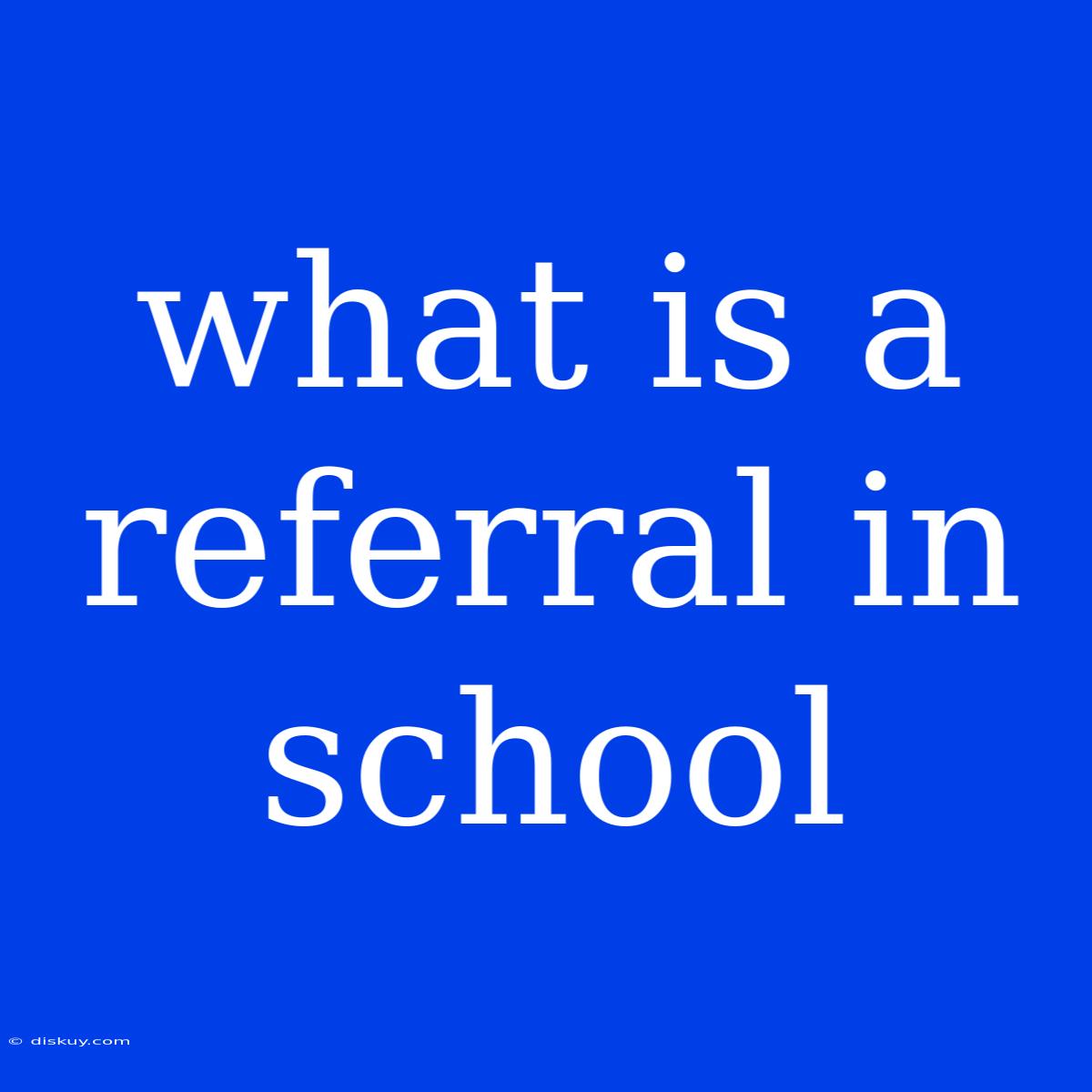What is a Referral in School: Understanding the Process and its Impact
What is a referral in school, and why should parents be aware? A referral is a formal request for support or intervention for a student who is struggling in some way. This can involve academic performance, behavior, social skills, or even mental health. Editor Note: School referrals are an important tool for helping students get the support they need to thrive.
Understanding school referrals is crucial for parents as it allows them to be informed partners in their child's education and well-being. It also helps parents understand the potential impact on their child's academic and social progress.
Analyzing the Referral Process and its Importance:
We've analyzed various school policies and educational resources to provide a comprehensive guide on school referrals. This will help parents, students, and educators better understand the referral process, its significance, and how it ultimately benefits students.
Key Takeaways of School Referrals
| Aspect | Description |
|---|---|
| Purpose | To identify and address specific needs of students experiencing difficulties. |
| Initiators | Teachers, counselors, administrators, or even parents may initiate a referral. |
| Types of Referrals | Academic, behavioral, social-emotional, and special education referrals. |
| Outcomes | Student support plans, interventions, and potential accommodations. |
School Referrals: A Deeper Dive
The Referral Process
- Identification: The referral process starts with the identification of a student's specific needs by teachers, counselors, or administrators. They may notice academic struggles, behavioral issues, or social difficulties.
- Documentation: The referring party creates documentation outlining the student's difficulties and observations. This may involve specific examples of challenging behaviors, academic performance data, or observations of social interactions.
- Review: The referral is then reviewed by a designated team, which may include school counselors, administrators, and specialists. They analyze the information provided and discuss the best course of action.
- Intervention: Based on the review, the team develops a plan for intervention, which may include academic support, counseling, behavioral interventions, or special education services.
- Collaboration: Parents are often involved in the referral process, participating in meetings and collaborating on the development of the student's support plan.
Types of School Referrals
- Academic Referrals: These are typically initiated when a student is struggling to keep up with their academics, showing difficulty with specific subjects, or lacking necessary skills for success.
- Behavioral Referrals: These happen when a student repeatedly disrupts the classroom, exhibits aggressive behavior, or is consistently breaking school rules.
- Social-Emotional Referrals: These are often triggered when a student demonstrates emotional difficulties, struggles with social interactions, or exhibits signs of anxiety or depression.
- Special Education Referrals: These are initiated when a student may have a learning disability or a physical or mental health condition that impacts their learning and requires specialized support and accommodations.
Impact of Referrals on Students
- Positive: Referrals can help students access the necessary support they need to thrive. They can provide personalized assistance, address specific needs, and create a more positive and supportive learning environment.
- Negative: Some students may feel embarrassed or stigmatized by the referral process. It's important for schools and parents to focus on the positive aspects of referrals - the goal is to help the student succeed, not to label or punish them.
FAQ: School Referrals
Q: What happens after a referral is made? A: The referring party will schedule a meeting with parents and relevant staff to discuss the concerns and develop a plan to support the student.
Q: Who can initiate a referral? A: Teachers, counselors, administrators, or even parents can initiate a referral.
Q: Will the student be placed in a special program? A: Not necessarily. The outcome of a referral may involve a variety of support options, ranging from extra tutoring to counseling or special education services.
Q: How can parents be involved in the referral process? A: Parents should attend meetings, provide input, and collaborate with school staff to develop the most effective support plan for their child.
Tips for Parents Regarding School Referrals
- Communicate openly with the school: Discuss any concerns you have about your child's learning or behavior and ask questions about the referral process.
- Stay involved: Attend meetings, share relevant information about your child, and work collaboratively with school staff.
- Understand the referral process: Familiarize yourself with the school's referral procedures and policies.
- Advocate for your child: If you believe your child's needs are not being met, advocate for additional support and services.
- Focus on solutions: Work with the school to develop a positive and supportive plan that will help your child succeed.
Summary: School Referrals as a Tool for Success
School referrals are a valuable tool for identifying and addressing students' needs. It is a process that involves collaborative efforts between school staff, parents, and students, with the ultimate goal of creating a positive learning environment where all students can thrive. By understanding the process and its potential impact, parents can actively participate and advocate for their child's well-being and educational success.

